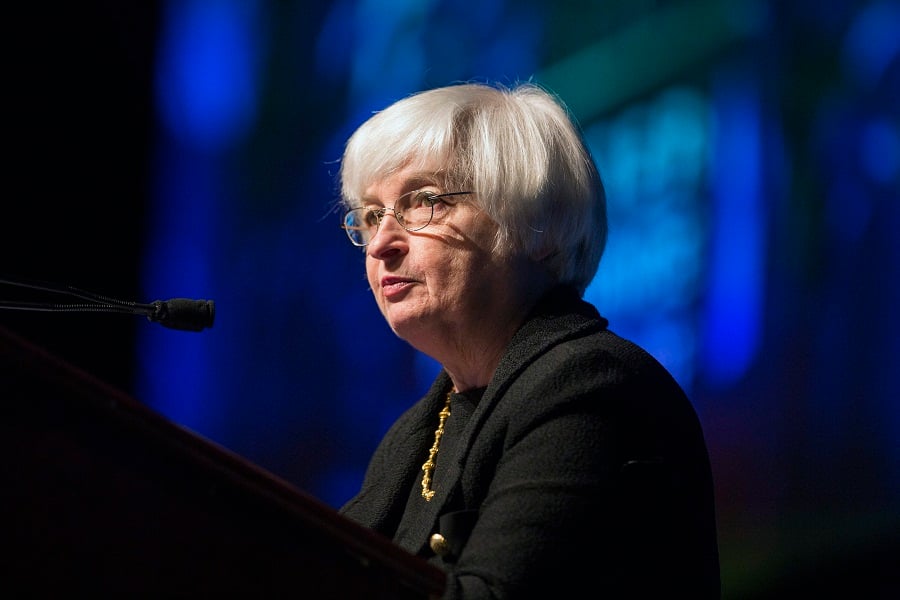Federal Reserve officials left interest rates unchanged and said they still expect to raise borrowing costs at a “gradual” pace while watching to see how the global economy and markets impact the U.S. outlook.
The Federal Open Market Committee is “closely monitoring global economic and financial developments and is assessing their implications for the labor market and inflation, and for the balance of risks to the outlook,” the central bank said in a statement Wednesday following a two-day meeting in Washington. The Fed omitted a line from the previous statement in December saying the risks to the outlook were “balanced.”
Since the Fed raised interest rates last month for the first time in almost a decade, turmoil in financial markets and a dimming of the outlook for global growth have spurred investors to expect a slower rise in borrowing costs. The median projection of policy makers' forecasts in December called for four quarter-point rate increases in 2016; futures markets indicated ahead of the FOMC statement that traders see just one or two hikes coming.
Chair Janet Yellen and her Fed colleagues, explaining their unanimous decision to leave the target range for their benchmark federal funds rate at 0.25% to 0.5%, said that recent information “suggests that labor market conditions improved further even as economic growth slowed late last year.”
(Related read: Market fall raises questions about Fed's monetary policy)
Reiterating the interest-rate outlook from the December statement, the FOMC said Wednesday that it “expects that economic conditions will evolve in a manner that will warrant only gradual increases in the federal funds rate.”
'MODERATE' GROWTH
Household spending and business fixed investment have been growing at “moderate rates in recent months,” the FOMC said, after labeling such gains “solid” in the December statement.
The Fed stuck to its projection that the pace of price gains will rise to 2% over the medium term but stated that inflation “is expected to remain low in the near term, in part because of the further declines in energy prices.”
Market-based measures of inflation expectations have “declined further,” while survey-based measures were “little changed” in recent months, the FOMC said.
Ms. Yellen won't hold a post-meeting press conference and isn't scheduled to speak publicly until she appears before the House Financial Services Committee on Feb. 10 to deliver the Fed's semi-annual monetary policy report to Congress.
Since the FOMC met Dec. 15-16, the U.S. labor market showed more of the improvement that encouraged the Fed to raise interest rates. Employers added 292,000 new jobs in December, bringing the 2015 total to 2.65 million. Wages also showed tentative signs of accelerating, providing good news for a Fed hoping to see inflation move closer to its 2% target this year.
Global stocks, however, have had their worst start to any year, dropping 8%, spooked by the slowing of China's economy and perhaps by a delayed response to the end of near-zero interest rates in the U.S.
(More insight: Jeffrey Gundlach: The Fed is off the mark)
RESTRAIN INFLATION
Oil prices have slid about 16% as of 11 a.m. New York time and the Bloomberg Dollar Spot Index has risen 1.4%. Such moves help to restrain inflation that policy makers see as too low.
The Fed's preferred price gauge rose 0.4% in November from a year earlier. Core inflation, which excludes food and energy, was 1.3% in November.
Though numerous private economists argue that China's direct impact on the U.S. economy is limited, and the drop in oil should ultimately prove a stimulus to growth, investors had pushed out their expectations for the next Fed interest-rate increase.
The probability of an increase in March had fallen to as low as 22% on Jan. 21 from a high of 53% on Dec. 30, based on prices in the federal funds futures market.
New York Fed President William C. Dudley, the only regional Fed chief with a permanent FOMC vote, said Jan. 15 that “in terms of the economic outlook, the situation does not appear to have changed much since the last FOMC meeting,” noting the stronger labor market.
In contrast, James Bullard, president of the St. Louis Fed, sounded a more cautious note on Jan. 14 by saying the latest decline in oil prices may delay the return of inflation to the central bank's 2% target.
FOMC ROTATION
The regional Fed presidents who vote on the FOMC rotate each January. This year's new voters are Mr. Bullard, Boston's Eric Rosengren, Cleveland's Loretta Mester and Kansas City's Esther George. They replaced John Williams from San Francisco, Chicago's Charles Evans, Richmond's Jeffrey Lacker and Atlanta's Dennis Lockhart.
Members of the Fed's Board of Governors hold permanent votes on the FOMC.
The FOMC made a separate decision on Wednesday to revise its 2012 statement on longer-run goals to say that the FOMC “would be concerned if inflation were running persistently above or below” its 2% objective.
Mr. Bullard dissented from approving this change because the language “is not sufficiently focused on expected future deviations of inflation from the goal,” according to the Fed.







